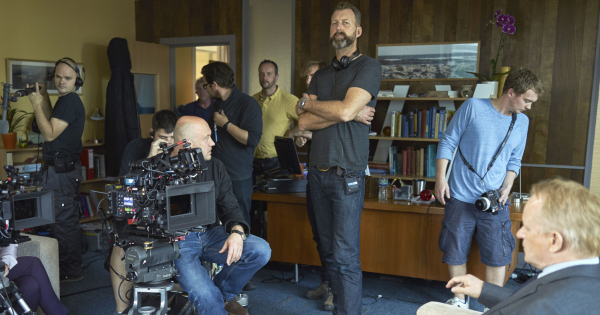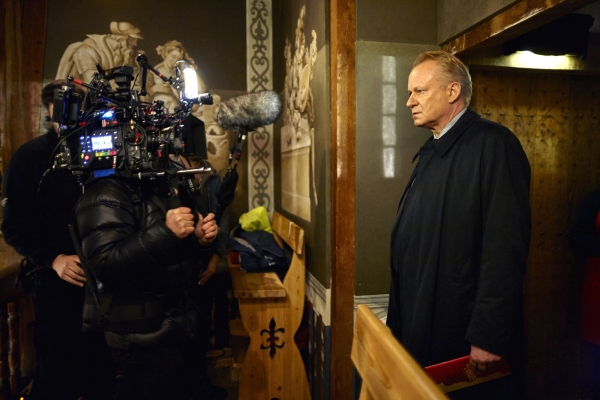Interview with 'River' director Richard Laxton
New BBC Drama River is a story about a Police detective who suffers a massive psychotic event when he loses his partner. The flagship drama stars Stellan Skarsgård, Nicola Walker, Eddie Marsan and is written by Abi Morgan.
Richard Laxton directed the first episodes of the series and he spoke exclusively to MOVIESCOPE about working with the cast, setting the tone and the different techniques he used to create the emotional instability of the characters.
Tell us about the story of River
It's a really original story of fragility and humanity. It's an opportunity to explore someone who is struggling with their mental health and, rather than make the audience observe them from a distance we try to understand, to some extent, what it is like to be in that position. It's a very compassionate piece. This is a beautiful script and it's very seductive and exciting.
When I first read the script, I didn't know who was going to play the lead. I went to the meeting thinking that whoever they attach to this script is going to be the deciding factor whether I do it or not. You could attach the wrong person to this and it just wouldn't work. So I arrived to the news that Stellan Skarsgård was going to do it and I think he is a genius, so I was straight in and couldn't wait to work with him.
It was kind of nerve-wracking because Stellan is so amazing and as director and actor, you also go on a very intimate journey together. We set up casting the rest of the piece and Stellan and I spent a day together doing screen tests with five different actors for one of the lead roles. I think he realised that I was a director who was passionate about the story and characters of the piece, rather than just obsessed by what we were going to do with the camera. Fortunately, we hit it off and he is an extraordinary person in many ways. I can't imagine anyone else playing this role.
What qualities does someone like Stellan bring to the role of River?
He is acutely intelligent, acutely funny and acutely instinctive about human nature. My challenge was to take the audience and put them in the top-pocket of a man who has a mental health problem. We both had a delight and fascination for Abi Morgan's script I knew how to get the story out of him, through the lens and on to the screen. We had a very sympathetic working relationship.
We both understood what was needed and he was open to notes and direction. With many actors, they want to lean back into the arms of the director so they have the freedom to make a mistake.
Stellan is a gift for a director and also incredibly understanding of what the crew need too. He helped them do their job in order that he could do his. The entire cast were wonderful.
You directed the first two episodes of River, do you enjoy setting the tone of the whole piece overall and what tone did you want to set for this production?
For most of the productions I've worked on in the last few years, I've been the one setting the tone and I do enjoy that. If you do pick up from someone else where the tone is already set, then that can be rather wonderful to clock in and run with it.
To set the tone for River, it's about climbing inside the writing and emotionally connecting with the writer’s message and story; all my choices come from inside that material. It's similar to the way an actor works; to play a role you can't do an impersonation of somebody, so you have to find your version of a particular character - the physiological character and landscape of what that person is. From that, I have an instinctive approach as to where the camera needs to be, whether that means to isolate a character or bring them closer to the audience.
The character of River sees ‘manifests’ (representations of the dead victims, conjured from River’s imagination) and that was a huge challenge in how to realise that in a way that didn't feel hokey. Fortunately, Stellan has an exquisite humour, warmth and vulnerability and because of that and the way we shot it, the audience will hopefully have the desire to stay with him.
What techniques did you use to capture River's emotional fragility and those manifests?
We used a lot editing techniques to create the sense of a fractured mind. We didn't do any effects with any of the characters but they would just disappear out of shot - we would cut back and they wouldn't be there. We also did quite a lot of sound work, so when the manifests’ speaks, the ambient sound around them changes so it feels like we are in Rivers' head.
I wanted the audience to feel closer to River than any other character - that wasn't to push the other characters away, it was just to bring him a little bit closer. The Director of Photography and I talked at length and we decided to use an eye-light on the side of the camera, that brought his eyes out. So, you always had these two pin-pricks of light in his eyes that made you feel that you were just seeing further into him; the audience will hopefully not notice that as a technique, but they may feel drawn to him. It's another way that we bring his experience to the audience so it's something that they believe and engage with.
River starts tonight on BBC1 at 9pm (Tuesday 13th October 2015).

